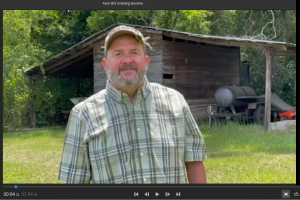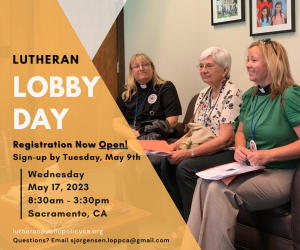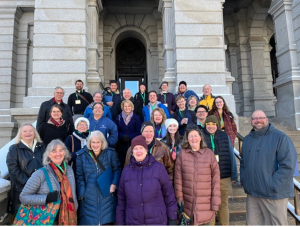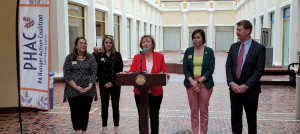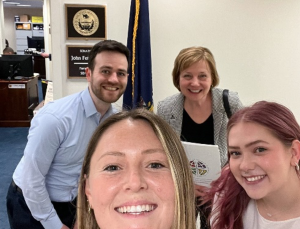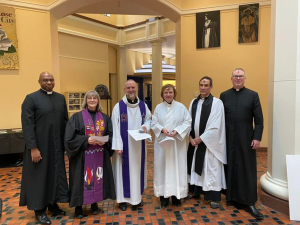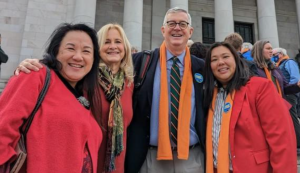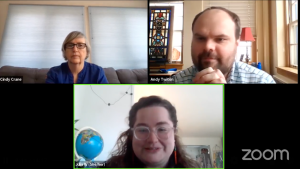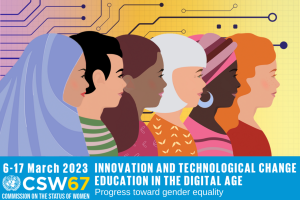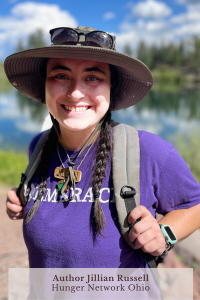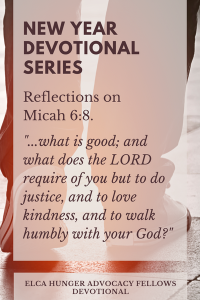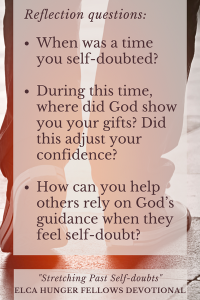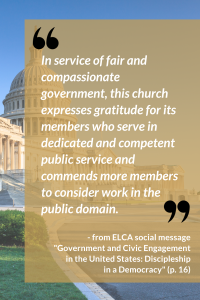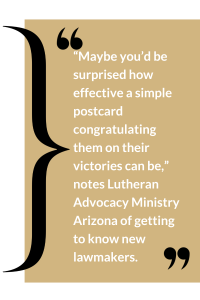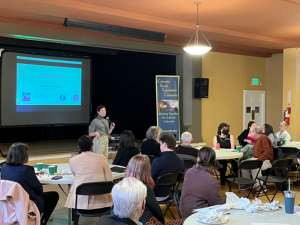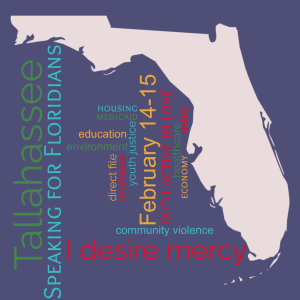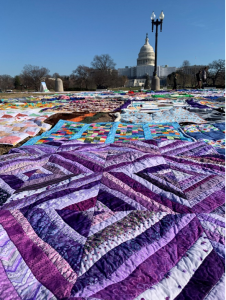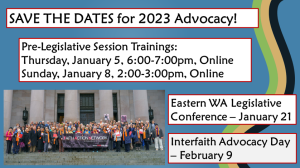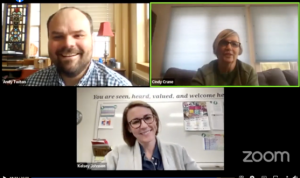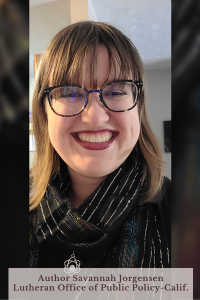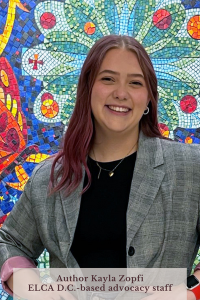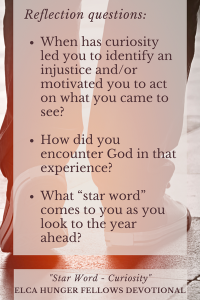Following are updates shared from submissions of the Lutheran Office for World Community and state public policy offices (sppos) in the ELCA Advocacy Network this month. Full list and map of sppos available.
U.N. | COLORADO | MINNESOTA | OHIO | PENNSYLVANIA | TEXAS |WASHINGTON | WISCONSIN |
Lutheran Office for World Community (LOWC), United Nations, New York, N.Y. – ELCA.org/lowc
Christine Mangale, Director
- LWF General Secretary Advocacy Visit: The Rev. Dr. Anne Burghardt, General Secretary of the Lutheran World Federation (LWF), together with Mr. Isaiah Toroitich, Head of Global Advocacy, and Rev. Arni Danielsson, Head of Communications, held their first advocacy mission to the United Nations (UN) headquarters since Rev. Dr. Burghardt was appointed to lead the global communion of churches. Colleagues from LWF and the Lutheran Office for World Community conducted high-level meetings with officials from UN agencies and Ambassadors from UN member states. These meetings included: Mr. Martin Griffiths, the Under-Secretary-General for Humanitarian Affairs and Emergency Relief Coordinator (UNOCHA), H.E. Miguel Ángel Moratinos, the UN Under-Secretary-General and High Representative for the United Nations Alliance of Civilizations, H.E. Mr. Sergiy Kyslytsya, Ukraine Ambassador to the UNHQ, the office of Mr. Sanjay Wijesekera, Director of Programme Group at UNICEF. Additional meetings and discussions were held with UNFPA, UN Women, Religions for Peace, World Council of Churches and Caritas. The General Secretary also preached at ELCA’s Saint Peter’s Church in Manhattan.
- LWF COVID-19 Advocacy Report Launch: LWF implemented a multi-pronged response to the COVID-19 pandemic, including through concerted advocacy and policy engagement. A study based on a series of interviews with LWF staff and members of partner organizations was undertaken by the Joint Learning Initiative (JLI). The report titled Until All Are Safe, No One Is Safe was launched during a hybrid event organized to coincide with the New York visit of the General Secretary. The report highlights the life-saving impact of the LWF’s Rapid Response Fund, the short and longer-term responses of churches and partners, and offers recommendations for policy makers, donors, churches and other faith actors for recovery and resilience building.
Colorado
Lutheran Advocacy Ministry Colorado (LAM-CO) – lam-co.org
Peter Severson, Director
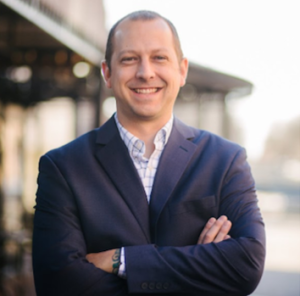 LUTHERAN DAY AT THE CAPITOL: Colorado Lutheran Day at the Capitol took place on Thursday, February 16, 2023. Our featured legislative speaker was Representative Andrew Boesenecker, a former ELCA pastor who now represents House District 53 in the Colorado legislature. He was re-elected in November 2022 and currently serves on the Transportation, Housing, and Local Government Committee;, State, Civic, Military, and Veterans Affairs Committee;, Appropriations Committee;, and Legislative Audit Committee. Rep. Boesenecker is also a member of the House Majority Leadership team, serving as House Majority Co-Whip. His legislative priorities continue to include affordable housing, gun violence prevention, single payer health care, and protecting our land, air and water.
LUTHERAN DAY AT THE CAPITOL: Colorado Lutheran Day at the Capitol took place on Thursday, February 16, 2023. Our featured legislative speaker was Representative Andrew Boesenecker, a former ELCA pastor who now represents House District 53 in the Colorado legislature. He was re-elected in November 2022 and currently serves on the Transportation, Housing, and Local Government Committee;, State, Civic, Military, and Veterans Affairs Committee;, Appropriations Committee;, and Legislative Audit Committee. Rep. Boesenecker is also a member of the House Majority Leadership team, serving as House Majority Co-Whip. His legislative priorities continue to include affordable housing, gun violence prevention, single payer health care, and protecting our land, air and water.
LEGISLATIVE SESSION CONTINUES: As the General Assembly continues its work, Lutheran Advocacy is working alongside coalition partners like the Renters’ Roundtable, the Helping Colorado Families Get Ahead coalition, and End Slavery Colorado to advance our policy agenda. You can learn more about what’s on our plate on our website, and check out all the latest bills we’re advocating on here.
Minnesota
Tammy Walhof, Director
Clean Energy/Climate: Minnesota passed 100% Carbon-free electricity by 2040, signed into law by Gov. Walz on Feb. 7. It contains important benchmarks along the way: 80% carbon-free electricity by 2030; 90% by 2035.
Various versions of this bill have been introduced over the last several years, and Lutheran Advocacy-MN has been engaged both on this and other legislation to increase the renewable energy standard.
Clean energy has champions in both parties. Unfortunately, the Minnesota DFL decision to pass legislation rapidly without amendments (to avoid Conference Committee negotiations) meant it was passed by strictly partisan votes in both chambers.
Nevertheless, we’ll take the win and continue to work with both parties on further climate legislation.
Affordable Housing/Homelessness: Eviction levels have reached very high rates, a combination of the pandemic, inflation, and the severe pre-existing housing crisis that has not had enough investment, despite yearly expenditures and broad support.
Funding for rental assistance, shelter, and other housing has moved quickly in the House, and been laid aside for possible inclusion in omnibus bills in the Senate. We are working to get it passed with bipartisan support.
Sacred Tiny House Communities: Legislation is being held back until it has a good list of bipartisan co-authors. Meantime, LA-MN is working to get letters and meetings of support from across the state, emphasizing the need a) for a class of housing less than 400 sq. feet, and b) for faith communities to have the discretion to create communities on their property without local “Not in my Backyard”(NIMBY) bans.
Ohio
Deacon Nick Bates, Director
With the launch of Ohio’s budget recommendations at the end of January, Ohio’s legislative sessions are up and running at full speed. At the Hunger Network in Ohio, we are focused on Healthy School Meals for All. In partnership with Hunger Free Schools Ohio, our goal is to ensure that all Ohio students have access to school meals. Hunger in Ohio remains unacceptably high. One in six children, and as many as one in four children in certain counties, live in a household that faces hunger, yet more than one in three children that live in a food– insecure household do not qualify for school meals. These meals help to acknowledge that well-nourished minds are not only healthier, but also help children learn better. Healthy School Meals for All also eliminates school meal debt and significantly reduces the administrative work required to operate the School Nutrition Programs and improve school nutrition finances. In addition, Healthy School Meals for All reduces the stigma associated with participating in school meals, which keeps children who need school meals from participating. Ensuring kids get healthy food is a critical step on the path out of poverty and into the workforce. When you have stronger, smarter, healthier kids, you have a stronger, smarter, healthier, more economically competitive state. Ohio needs Healthy School Meals for All. You can learn more at https://hungerfreeschoolsoh.org/impact.
Pennsylvania
Lutheran Advocacy Ministry – Pennsylvania (LAMPa) lutheranadvocacypa.org
Tracey DePasquale, Director
Hunger tops the policy agenda adopted by the Lutheran Advocacy Ministries in Pennsylvania Policy Council, as already-stressed feeding ministries brace for the elimination of emergency food assistance that totaled $2 billion in Pennsylvania in 2022. Housing/homelessness and creation care (especially climate and clean water) were named other top priorities for our work.
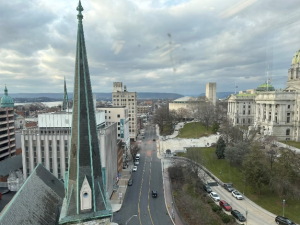 LAMPa Director Tracey DePasquale, who serves on the executive team of the Pennsylvania Hunger Action Coalition, is working to organize a Legislative Lunch & Learn hosted by the legislative Hunger Caucus on Feb. 27 in the Capitol’s East Wing Rotunda. ELCA World Hunger leaders in Pennsylvania have been tapped to make a personal invitation and attend with their lawmakers.
LAMPa Director Tracey DePasquale, who serves on the executive team of the Pennsylvania Hunger Action Coalition, is working to organize a Legislative Lunch & Learn hosted by the legislative Hunger Caucus on Feb. 27 in the Capitol’s East Wing Rotunda. ELCA World Hunger leaders in Pennsylvania have been tapped to make a personal invitation and attend with their lawmakers.
DePasquale has also been working with housing and racial justice advocates in the Southwestern Pennsylvania Synod, ELCA World Hunger and the ELCA Witness in Society federal office as they prepare to honor the work of Dr. Martin Luther King Jr. with learning and advocacy on the anniversary of his death in March. In related work, LAMPa continues to work with the federal office in a follow up to the Homeless Remembrance Blanket Project, securing invitations to members of Congress for visits to ministries with those experiencing homelessness or housing insecurity.
LAMPa is searching for a full-time communications and advocacy engagement manager. Do you (or someone you know) have professional communications experience, a passion for justice and a call to serve God’s mission in the world — especially in the public square? Learn more here, including how to apply for this position within ELCA Witness in Society.
Texas
Scott Atnip, Outreach Director
The Texas Legislature has convened for their 140 day biennial legislative session, and Texas Impact is using the first third of the session for membership events and encouraging members to build relationships with their legislative offices. The opening day of the session, Texans of faith gathered with Texas Impact, faith leaders and elected representatives for the Interfaith Service of Public Witness.
The United Women in Faith Legislative Conference sold out with over 200 participants, including many Lutherans for a three– day legislative conference and advocacy day at the Capitol. Regina Banks, Director of the Lutheran Office of Public Policy, California, was a keynote speaker and attended the event. Additional advocacy opportunities include Texas Interfaith Advocacy Days, February 19-21, and coalition advocacy days for gun reform, maternal health, LGBT equality and more.
Texas Impact is organizing Texans of faith through Legislative Engagement Groups by district, and in issue specific teams. Courts and Ports trips to the border have also restarted to allow faith leaders to serve as court observers and learn about issues at the U.S./Mexico border.
All of this and more is highlighted on Texas Impact’s weekly podcast, Weekly Witness, featuring elected representatives, faith leaders and advocates.
Washington
Faith Action Network (FAN) – fanwa.org
Elise DeGooyer, Director
We are halfway through the 2023 Washington State Legislative Session that will last into April. Lawmakers will focus this session on creating a two-year state budget, as well as hear from Faith Action Network(FAN) and our partners on bills related to universal school meals, housing justice, expanding the Working Families Tax Credit, assault weapons ban, healthcare for immigrants, solitary confinement, and addressing climate change. Once again, we have an ambitious Legislative Agenda that you can follow with our Bill Tracker.
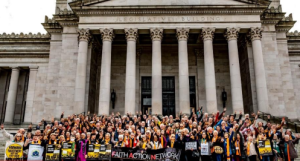 One highlight of the session so far was gathering 200+ advocates in our network on February 9 for the first in-person Interfaith Advocacy Day in Olympia in three years! Standing together on the Capitol steps was a jubilant moment in a day filled with learning, engaging, and advocating. From Bellingham to Vancouver, Port Angeles to East Wenatchee and Yakima, and all along the I-5 corridor, 207 people from 36 districts attended over 87 meetings with their legislators.
One highlight of the session so far was gathering 200+ advocates in our network on February 9 for the first in-person Interfaith Advocacy Day in Olympia in three years! Standing together on the Capitol steps was a jubilant moment in a day filled with learning, engaging, and advocating. From Bellingham to Vancouver, Port Angeles to East Wenatchee and Yakima, and all along the I-5 corridor, 207 people from 36 districts attended over 87 meetings with their legislators.
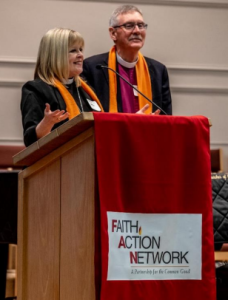 ELCA Bishops Shelley Bryan Wee of Northwest WA Synod and Rick Jaech of Southwestern WA Synod shared reflections on how we are called by our faith traditions to learn and to act for justice. We were delighted to be visited by Rep. My-Linh Thai, first refugee member of our legislature, whose passionate message resonated with ours: that love guides her policymaking decisions as she calls on her colleagues to do what is right. Workshops on each category of our legislative agenda were expertly presented by our coalition partners and FAN leaders. Advocates caucused with others from their legislative districts and attended afternoon meetings with legislators. More photos of attendees energized by democracy in the sunshine can be found on our Facebook album. We plan to keep the momentum going through the rest of session and throughout the year!
ELCA Bishops Shelley Bryan Wee of Northwest WA Synod and Rick Jaech of Southwestern WA Synod shared reflections on how we are called by our faith traditions to learn and to act for justice. We were delighted to be visited by Rep. My-Linh Thai, first refugee member of our legislature, whose passionate message resonated with ours: that love guides her policymaking decisions as she calls on her colleagues to do what is right. Workshops on each category of our legislative agenda were expertly presented by our coalition partners and FAN leaders. Advocates caucused with others from their legislative districts and attended afternoon meetings with legislators. More photos of attendees energized by democracy in the sunshine can be found on our Facebook album. We plan to keep the momentum going through the rest of session and throughout the year!
Wisconsin
Lutheran Office for Public Policy – Wisconsin (LOPPW) loppw.org
The Rev. Cindy Crane, Director
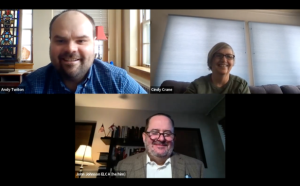 Wednesday Noon Live: We interviewed John Johnson, ELCA Domestic Policy Director, on the Farm Bill.
Wednesday Noon Live: We interviewed John Johnson, ELCA Domestic Policy Director, on the Farm Bill.
Partnerships and Coalitions
At a recent South-Central Synod event, the Lutheran Office of Public Policy in Wisconsin (LOPPW) and a representative from Women of the ELCA(WELCA) co-led a workshop on social media and engaging with the news.
LOPPW recently joined a new coalition, Wisconsin Coalition for Safe Roads, which is a broad group including secular and faith-based leaders, advocates for immigration rights, and farm groups. The focus of the coalition is to pass legislation to allow driver’s licenses for immigrants who do not qualify for Real IDs.
We continue to be part groups including the Wisconsin Climate Table, where the director is part of a working group making the Wisconsin Clean Energy Plan known; Healthy School Meals for All Coalition; the Wisconsin Consortium for Anti-Sex Trafficking; and the Raise the Age Coalition, which LOPPW helped to re-unite in 2020. Our ELCA group planning the Youth Advocacy Retreat also meets regularly.
The Wisconsin State Budget
We expect new energy around the driver’s license issue and returning 17-year-old youth to the juvenile justice system. Both will likely be in the Governor’s budget but will hopefully have independent bills.
Our interfaith advocacy day will be focused on hunger, climate, and water. The organizers, LOPPW and Faith in Place, are consulting with our speakers from Renew Wisconsin and Clean Wisconsin to choose issues on energy and water to advocate on. We will also choose issues related to hunger.
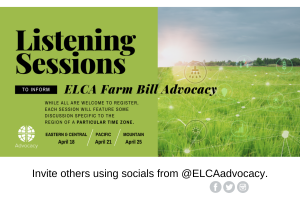 Young Adult-focused sessions
Young Adult-focused sessions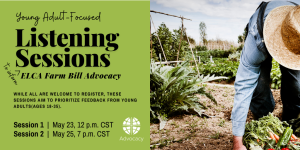 Pacific Time Zone focus
Pacific Time Zone focus
